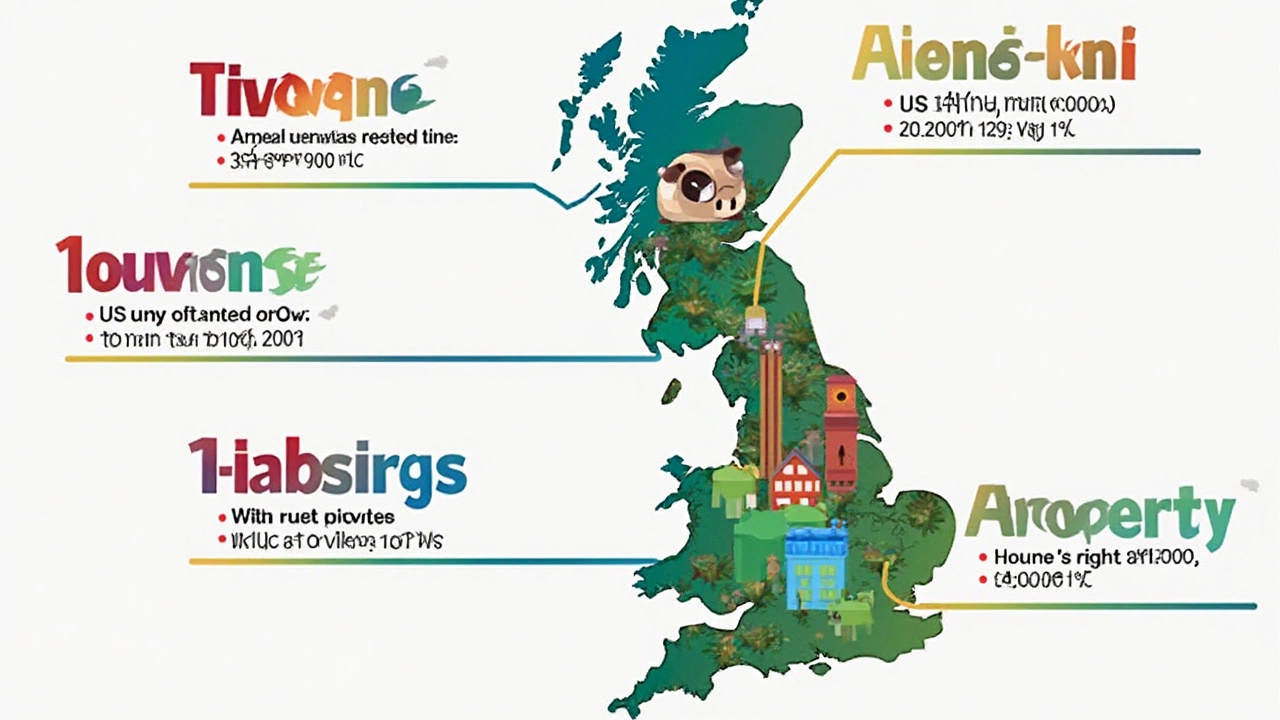So, you're curious about Individual Savings Accounts, or ISAs, and whether they're tax-free, right? Well, ISAs are one of the UK's favorite ways to tuck money away without the taxman getting involved. But there's a bit more to it than just saying they're tax-free.
First off, let's talk about what an ISA is. Put simply, it's a kind of savings account that shields your interest, dividends, or capital gains from tax. Sounds good, doesn't it? But there's a twist: the UK government sets a yearly limit on how much you can deposit into these accounts. For the 2024/2025 tax year, that's £20,000. Now, believe it or not, that's a pretty generous allowance!
Now, it's time to spill the tea on the different types of ISAs you can choose from. You've got Cash ISAs, Stocks & Shares ISAs, Lifetime ISAs, and Innovative Finance ISAs to play with. Each one has its own rules and quirks, so it's all about finding the right match for your situation.
What is an ISA?
An Individual Savings Account, better known as an ISA, is basically a tax-free way to save or invest your money in the UK. The beauty of an ISA is that it protects the interest, dividends, or capital gains you earn from being taxed. Think of it as a protective bubble for your money.
ISAs come in different flavors to suit various saving habits and goals. Each year, you're allowed to save up to a set limit without paying a penny in tax on what you earn from those savings. Tax-free savings sound appealing? Well, you bet they are!
Different Types of ISAs
There are four main types to choose from:
- Cash ISA: This works like a regular savings account, except that the interest you earn is tax-free. It's a safe bet for those who favor stability and want quick access to their cash.
- Stocks & Shares ISA: Here, your money is invested in the stock market. This can potentially offer higher returns, but remember, with the ups come the downs.
- Lifetime ISA (LISA): Save for your first home or retirement with this option. If you're between 18 and 39, the government chips in with a 25% bonus on your savings, up to a certain limit.
- Innovative Finance ISA: If you're the adventurous type, this might interest you. It's about lending your money to businesses and receiving interest as tax-free income. But do note, it has higher risks.
Here's a quick look at the annual ISA allowance for 2024/2025:
| ISA Type | Allowance |
|---|---|
| Total ISA | £20,000 |
| Lifetime ISA | £4,000 |
And remember, the total annual limit is £20,000 across all your ISA holdings. That means you could put £10,000 in a Cash ISA and £10,000 in a Stocks & Shares ISA within the same tax year.
To wrap it up, ISAs offer a fantastic way to save or invest without the tax woes. Whether you go for safety with a Cash ISA or potential growth with a Stocks & Shares ISA, the choices give you flexibility. It's all about what suits your financial game plan best!
Types of ISAs
Alright, let's break down the different types of ISAs—you'll need to know these to make the most of those tax-free savings. Each type has its perks and rules, so understanding them is key to choosing the right fit for your financial goals.
Cash ISAs
Think of a Cash ISA like your everyday savings account, but with a major twist: any interest you earn in this account isn't taxed. That's right—nada for the taxman. They're super simple and there's no risk involved since your money isn't exposed to the stock market. Perfect for if you like playing it safe.
Stocks & Shares ISAs
Feeling adventurous? A Stocks & Shares ISA lets you invest in stocks, bonds, and funds. Potentially, you could make more than with a Cash ISA, but remember, investments can go down as well as up. Any gains or dividends you snag here are tax-free, which is a sweet deal for long-term growth.
Lifetime ISAs
These are designed for the big stuff—think first-time home buying or retirement. If you're under 50, you can save up to £4,000 a year, and the government sweetens the pot by adding a 25% bonus to your savings. Are there restrictions? Sure, but if your plan syncs up with buying a house or retirement, it's a no-brainer.
Innovative Finance ISAs
More niche, but worth a look if peer-to-peer lending piques your interest. Your money is lent to borrowers through lending platforms. The risk is higher, but hey, so could be the returns, and yes, the interest you earn is tax-free.
Here's a quick recap to keep it all straight:
| ISA Type | Main Feature |
|---|---|
| Cash ISA | Tax-free interest, low risk |
| Stocks & Shares ISA | Invest in markets, tax-free growth (but risky) |
| Lifetime ISA | Government bonus, for first home/retirement |
| Innovative Finance ISA | Peer-to-peer lending, tax-free interest |
No doubt, picking the right ISA can feel daunting, but armed with this info, you'll be navigating your options like a pro. Whatever you choose, remember it’s about what suits your situation and goals best.

Tax Benefits of ISAs
Alright, let’s get into the specifics of why ISA accounts are a dream come true for savers. The standout feature of all Individual Savings Accounts is that any interest, capital gains, or dividends you earn are free from UK tax. Yes, you heard that right—no tax, nada.
Take the Cash ISAs, for instance. The interest you earn isn't chipped away by tax, so what you see is what you get. If you’re someone who prefers predictability and safety, Cash ISAs can be super appealing.
On the other hand, with Stocks & Shares ISAs, there’s potential for more growth because you're investing in the stock market. Here, any dividends from your investments are tax-free. Plus, any gains you make when you sell investments inside the ISA are protected from Capital Gains Tax. It’s a nice little shield for your profits!
If you haven’t heard about Lifetime ISAs yet, they’re worth a look too. Not only do you get tax-free growth, but the government adds a 25% bonus on your savings up to £1,000 a year. It's geared towards buying your first home or saving for retirement, making it a killer boost for specific goals.
Let’s not forget Innovative Finance ISAs, which allow investing in peer-to-peer lending while enjoying the usual tax-free advantages. This is a bit more niche but worth considering if traditional savings don't quite cut it for you.
| Type of ISA | Tax Benefit |
|---|---|
| Cash ISA | No tax on interest earned |
| Stocks & Shares ISA | Dividends and capital gains are tax-free |
| Lifetime ISA | Tax-free savings with a government bonus |
| Innovative Finance ISA | Tax-free interest on peer-to-peer lending |
So, in a nutshell, ISAs make saving more efficient by keeping the taxman at bay, and they offer flexibility in how you want to save or invest. Choosing the right ISA depends on what matches your financial goals, but the tax benefits are universal and absolutely worth considering in any saving strategy.
Annual ISA Limits
Alright, let's break down the annual limits for your ISA accounts. These are super important if you want to make the best of the tax-free benefits. For starters, the annual limit means there's a cap on how much you can stick into your ISAs every tax year. And this can change annually, depending on what the government decides.
Right now, for the 2024/2025 tax year, the amount you can invest across all your ISAs is stuck at a neat £20,000. Not bad, right? You could put the whole £20,000 into a single ISA, like a Cash ISA, or spread it across various types like Stocks & Shares ISAs or Lifetime ISAs.
Maximizing Your Allowance
So, what’s the trick to making the most of it? It’s about smart planning! You could divvy up your contributions, like putting £10,000 into a Cash ISA for easy access and £10,000 into a Stocks & Shares ISA if you're feeling adventurous with potential for growth.
- Remember, any allowance you don't use by April 5th is lost forever – it doesn't roll over into the next year.
- Use a mix of ISAs to balance between secure saving and risking a bit more for higher returns.
These limits and rules are designed to keep your savings flexible while still giving you those sweet tax breaks. Don’t forget, the government might tweak these limits over time, so it's worth keeping an eye on those changes if you want to hit that savings sweet spot. Happy saving!

Choosing the Right ISA
Picking the right ISA can feel like choosing a flavor at an ice cream shop. So many options! But no worries, it's easier when you know what each ISA account offers.
Consider Your Goals
Think about what you're saving for. A house? Retirement? Maybe a little financial cushion? For long-term goals like buying your first home, a Lifetime ISA could be your best bet, thanks to that 25% annual government bonus. If it's all about rainy day savings, a Cash ISA might do the trick, giving you tax-free interest.
Check the Risks You’re Willing to Take
If you're okay with a bit of risk for possibly higher returns, take a look at Stocks & Shares ISAs. These can grow faster but keep in mind, they can shrink too. For the more adventurous, Innovative Finance ISAs let you invest in things like peer-to-peer lending.
Know the Rules
Each ISA has its own set of rules. For instance, you can't open a new Cash ISA and Stocks & Shares ISA in the same year and put money into both beyond your annual limit. If you're 40 or older, sorry, no Lifetime ISAs for you.
Compare the Offers
Banks and building societies have different offers, and some come with better interest rates or lower fees. It's worth shopping around, like you would for anything else.
If you’re still unsure which type of ISA to pick, a financial adviser can shed some light tailored to your specific situation. Knowing your risk level, goals, and the specific rules of each type is key in choosing the right one. Whatever you decide, make sure you’re leveraging the tax advantages these accounts provide—they're there to help your savings grow uninterrupted by taxes.
